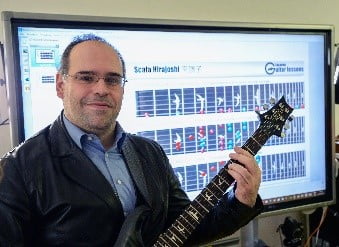Music theory – a necessary tool to achieve musical freedom
By Max Canonaco
From since I’ve been learning to play guitar, 23 years ago, until now as a guitar instructor, I’ve been noticing a generally diffused and dangerous thought about music theory. Many guitar players – especially if self-taught – develop the idea that “Music theory can affect your musical freedom”, or that “I need to be intuitive to be creative, so why should I use those rigid concepts?” But when it comes to a semiprofessional or professional level, and you still listen someone thinking that way, you should ask yourself a few important questions.
Why is music theory important for a musician?
Why is music theory so important to reach a real musical freedom?
We could imagine that the dangerous thoughts at the top of the article come from part of the grunge, punk scene. In a way, we can clearly say that some bands or musicians have brought and still bring many young players to believe that musical theory is very secondary or even a contrary effort if you want to unleash musical intuition. But in fact, the opposite is true: intuition can be expresses if thoughts are removed and are not there while you create a piece of music.
Intuition requires mental “space” to happen. Think about it. If each time you want to be creative, you must think about what and where the notes are, where and what relationship between notes are, if you have to figure out what kind of chords produce what kind of effect in what kind of musical situation each time you play… How can you really be creative? Your only choice would be to reinvent the wheel each time… Always the same wheel.
I still hear sometimes comments like “I can figure it out by ear”. Really? What it is exactly that you think you can figure out by ear? You do not know it exactly only using your ear (how would you name it?) … And, even if you could, it would always be the same old reinvented wheel we talked about. Why? Because your ear likes to work inside the comfort zone (or what your ear can comfortably recognize) and tend to even “complete” the music you hear, if the notes of the chord are not all there, based on how your ear is formed. So, what music theory does, is to give you tools to expand the comfort zone of your ear, forcing your ear to train to listen something different, so that you can learn how to use this “new” musical thing. It is a mere illusion to think that you can figure out by ear in a decent time something you never listened to: this would require you many months or years, and still you would not feel confident when playing that stuff. I have been there and I know it. Even if you had a perfect pitch, could you really be confident with your playing if you do not even know what you are doing? And if you could, how can you say how much your creative skills have improved? By ear? And how could you communicate with other players or musicians? By ear?
To achieve a greater musical freedom, you should eliminate your thoughts gradually, one by one, becoming conscious about those thoughts, to eliminate what holds you back from unleashing your creativity and intuition. Resolve the mental or physical problem related to the presence of this thought and then come back and isolate the next thought, eliminate, and so on and so forth. You will gradually become more free. You will be nearer to the perception and vision of reality. You will free your will. As you see, you cannot do that without the knowledge (music theory). I do not intend to say that every concept expressed in music theory in history is perfectly logic or easy to apply to become more creative. It will make sense to you when you have a capable instructor, that knows how to teach you the music theory and its applications considering the music you like: then it will become easy. Understanding theory can really make the difference in speeding up the visualization on the fretboard, so that you can think about what it that you want to express, rather than to “where is the C minor scale around the 12th fret?”.
I hope it will cost to you less time than it costed to me to understand that music theory is so important and often undervalued, by reading this article.
About the author: Max Canonaco is a professional guitar player and guitar instructor, based in Locarno, Switzerland. If you are looking for guitar lessons in Locarno, please be sure to contact Max.

© 2017, Massimo Canonaco
